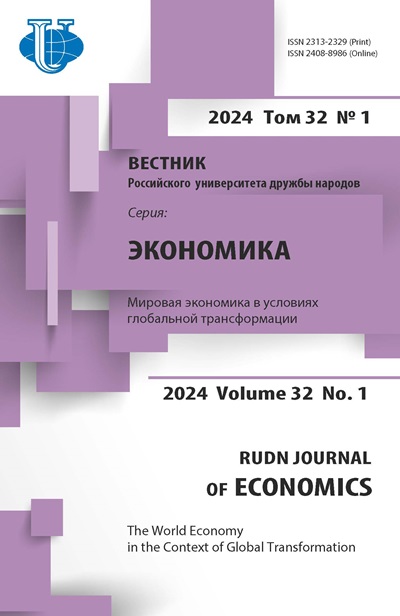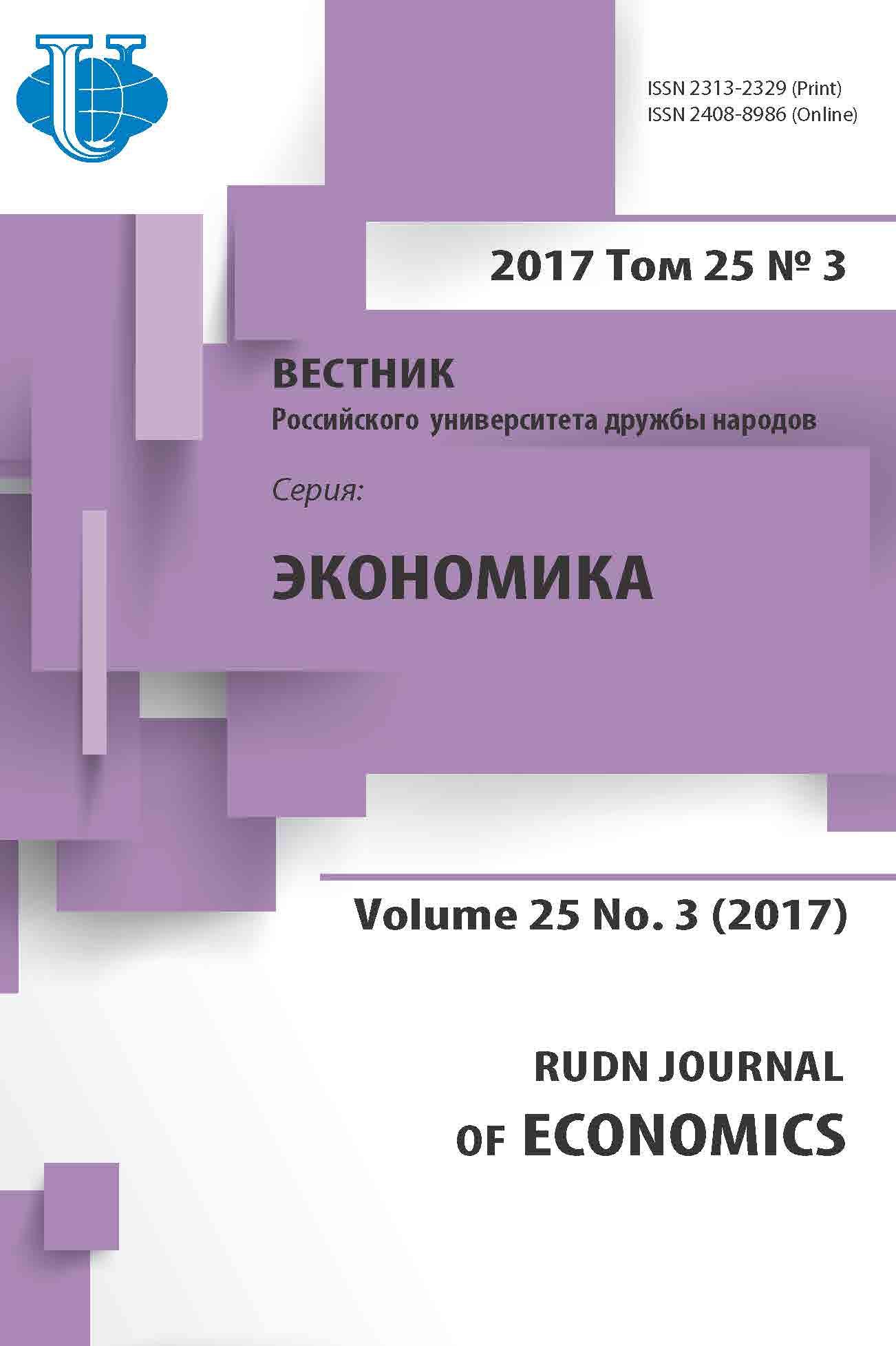BASIC FOUNDATIONAL PREREQUISITES FOR FORMING EFFECTIVE EMPLOYMENT IN ECONOMIC SYSTEMS FOR INCLUSIVE ECONOMIC GROWTH
- Authors: Ziankova IU1
-
Affiliations:
- Polotsk State University
- Issue: Vol 25, No 3 (2017)
- Pages: 333-342
- Section: Articles
- URL: https://journals.rudn.ru/economics/article/view/17765
- DOI: https://doi.org/10.22363/2313-2329-2017-25-3-333-342
Cite item
Full Text
Abstract
At the moment, the theoretical and methodological foundations for achieving full and effective employment have not been fully studied by scientists, and the fundamental prerequisites for ensuring economic growth have not been systematized. The relevance of the research is proved by analyzed practical basis for the formation of employment in context of countries with grounded economic indicators: labor productivity, GDP dynamics. The aim of the research is to develop the theoretical and methodological foundations for effective employment of the population on the basis of the genesis of the fundamental prerequisites for the formation of effective employment for inclusive economic growth. The novelty of this research is that the fundamental prerequisites for the formation of effective employment have been studied and scientifically grounded. The author comes to the conclusion that when forming effective employment it is important to take into account the coordinated development of the labor market and market of educational services; interaction of the labor force’s skill level and the elasticity of demand for labor resources by the level of wages; correlative interaction of labor productivity in the workplace, in the household and the life cycle of a person; the relationship between the degree of elasticity of the supply of female labor and the level of wages, between the number of children in a family and their age; the conjugation of the workforce with the company’s objectives, the policy of forming the level of wages, the coefficient of labor participation; institutional rules on the labor market, which complement the market laws operation.
About the authors
I U Ziankova
Polotsk State University
Author for correspondence.
Email: azenkov@yandex.by
Ziankova I.U., Cand. Econ. Sci., associate professor, head of the department of economics, management and economic theory of the Polotsk State University.
29 Blokhin str, Novopolotsk, the Republic of Belarus, 211440References
- Altman M. (2012) Economic Growth and the High Wage Economy. Choices, constraints and opportunities in the market economy. M. Altman. UK by Routledge. 313 p. URL: https://doi. org/10.4324/9780203114971 (accessed: 25.05.2017).
- Bertola G. (2010) Microeconomic perspectives on aggregate labor markets / Giuseppe Bertola. Handbook of labor economics; edited by Orley C. Ashenfelter and Richard Layard. North-Holland, Volume 3. Part C. Chapter 45. P. 2985—3028. URL: https://doi.org/10.1016/S1573-4463(99)30036- 5(accessed: 21.05.2017).
- Blau F. D. (2010) Institutions and laws in the labor market / Francine D. Blau, Lawrence M. Kahn. Handbook of labor economics; edited by Orley C. Ashenfelter and Richard Layard. North-Holland, Volume 3. Part A. Chapter 25. P. 1399—1461. URL: https://doi.org/10.1016/s1573-4463(99)03006-0. (accessed: 21.05.2017).
- Davis S.J. Gross job flows , Steven J. Davis, John Haltiwanger. (2010) Handbook of labor economics; edited by Orley C. Ashenfelter and Richard Layard. North-Holland. Volume 3. Part B. Chapter 41. P. 2711—2805. URL: https://doi.org/10.1016/s1573-4463(99)30027-4 (accessed: 21.05.2017)
- Eranbarg R.G. (1996) Sovremennaya ekonomika tryda: teoriya i gossydarstvennaya politika [Modern Labor Economics: Theory and Public Policy]. R.G. Eranbarg, R.S. Smit. M.: Izd-vo MSU, 800 p. (In Russ).
- Europe 2020 “A strategy for smart, sustainable and inclusive growth”. Communication from the commission. Brussels, 2010. 32 p. URL: http://ec.europa.eu/eu2020/pdf/COMPLET%20EN%20 BARROSO%20%20%20007%20-%20Europe%202020%20-%20EN%20version.pdf (accessed: 11.05.2017).
- Galbraith D. (1979) Ekonomicheskie teorii i tsely obschestva. Per. s angl. pod red. N.N. Inozemtseva, A.G. Mileykovskogo. M.: Progress, 406 p. (In Russ).
- Kane F. (2008) Izbrannye ekonomicheskie sochineniya. F. Kane.; per. s angl. A.V. Gorbunova, F.R. Kaplan, L.A. Feyginoy. M.: Directmedia Publishing, 2008. 517 p. (In Russ).
- Keynes, J.M. (1936) The General Theory of Employment, Interest, and Money. 263 p. URL: http:// cas2.umkc.edu/economics/people/facultypages/kregel/courses/econ645/winter2011/ generaltheory.pdf (accessed: 28.05.2017).
- Lavoie M. (2013) Wage-led Growth. An Equitable strategy for economic recovery. Marc Lavoie and Engelbert Stockhammer. UK by Palgrave Macmillan and ILO. 193 p. URL: https://doi. org/10.1057/9781137357939 (accessed: 12.05.2017).
- Manger K. Izbrannye raboty. K. Manger. M.: Izd-vo «The territory of the future», 2005. 496 p. (In Russ).
- Marks K. (1983) Process proizvodstva kapitala. K. Marks. Kritika politicheskou ekonomii. K. Marks. M.: Politizdat, V 1. b.1, 3883 p. (In Russ).
- Marshall A. (1983) Printsipy politeconomii. A Marshall; per. s angl. R.I. Stolpera. M.: Izd-vo «Progress». V. 1. 415 p. (In Russ).
- Montgomery M. (2010) Models of marital status and childbearing / M. Montgomery, J. Trussel. Handbook of labor economics; edited by Orley C. Ashenfelter and Richard Layard. North-Holland. V.1. Part 3. P. 205—271. URL: https://doi.org/10.1016/S1573-4463(86)01006-4 (accessed: 20.05.2017).
- Petty Y. (1940) Economicheskie i statisticheskie raboty. Per. s angl. pod red d-ra ekon. nayk M. Smit i s predisl. d-ra ekon. nayk D. Rozenberga. M.: Izd-vo State-Economic. 368 p. (In Russ).
- Rikardo D. (1955) Nachala politicheskou ekonomii i nalogovogo oblozeniya. D. Rikardo. Izbrannoe. D. Rikardo. M.: State Publishing House, 1955. V. 1. 539 p. URL: http://www.twirpx.com/ file/640776 (accessed: 05.05.2017). (In Russ).
- Smit A. (2009) Issledovanie o prirode i prichinah bogatstva narodov. A. Smit; per. s angl. i s predisl. V.S. Afanasyevou. M.: Eksmo. 960 p. (In Russ).
- Taubman P. (2010) Segmented labor market. Paul Taubma, Michael L. Wachter. Handbook of labor economics; edited by Orley C. Ashenfelter and Richard Layard. North-Holland. Volume 2. Chapter 21. P. 1183—1217. URL: https://doi.org/10.1016/s1573-4463(86)02011-4 (accessed: 11.05.2017).
- World Development Indicators: Decent work and productive employment. URL: http://wdi.worldbank. org/table/2.4 (accessed: 06.06.2017).















